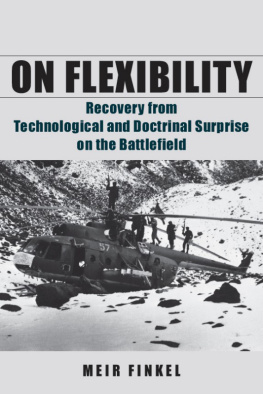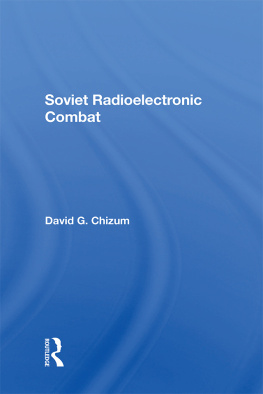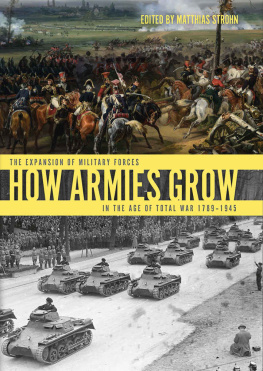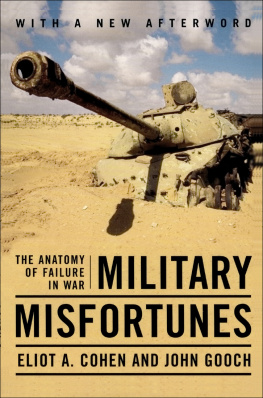On Flexibility
RECOVERY FROM TECHNOLOGICAL AND DOCTRINAL SURPRISE ON THE BATTLEFIELD
Meir Finkel
Translated by Moshe Tlamim
STANFORD SECURITY STUDIES
An Imprint of Stanford University Press
Stanford, California
Stanford University Press
Stanford, California
English translation 2011 by the Board of Trustees of the Leland Stanford Junior University. All rights reserved.
On Flexibility was originally published in Hebrew in 2007 under the title Al Hagmishut 2007, Maarachot.
No part of this book may be reproduced or transmitted in any form or by any means, electronic or mechanical, including photocopying and recording, or in any information storage or retrieval system without the prior written permission of Stanford University Press.
Special discounts for bulk quantities of Stanford Security Studies are available to corporations, professional associations, and other organizations. For details and discount information, contact the special sales department of Stanford University Press.
Tel: (650) 736-1782, Fax: (650) 736-1784
Printed in the United States of America on acid-free, archival-quality paper
Library of Congress Cataloging-in-Publication Data
Finkel, Meir, 1968- author.
[Al ha-gemishut. English]
On flexibility : recovery from technological and doctrinal surprise on the battlefield / Meir Finkel ; translated by Moshe Tlamim.
pages cm
Includes bibliographical references and index.
ISBN 978-0-8047-7488-8 (cloth : alk. paper) -- ISBN 978-0-8047-7489-5 (pbk. : alk. paper)
ISBN 978-0-8047-7715-5 (electronic)
1. Military readiness. 2. Military doctrine. 3. Military art and science. 4. Surprise (Military science) 5. Military history, Modern--20th century. 6. Technology--Military aspects. I. Tlamim, Moshe, translator. II. Title.
UA10.F5413 2011
355.02--dc22
2010045287
Typeset by Bruce Lundquist in 10/14 Minion
To my wife Amira, and children Yael, Alon, and Yiftach for their patience and support
TABLE OF CONTENTS
ACKNOWLEDGMENTS
I am deeply indebted to my Ph.D. thesis supervisor Dr. Avi Kober of Bar-Ilan University. His intellectual and methodological approaches have been veritable guiding lights, and his classical style of mentor-pupil instruction the ideal relationship for me.
I began my research as a student in the thirty-first class of the National Security College and was fortunate to have the willing support of many people. Professor Gavriel Ben Dor, the colleges academic advisor, and Dr. Uri Bar-Josef of Haifa University were my M.A. thesis advisors on military intelligence in force planning.
Sincerest thanks are extended to Eado Hecht for his incisive comments on my analysis of historical events, especially the parts on Sagger missiles, the T-34 tank, the blitzkrieg, and German armor in the Western Desert. I am grateful to both Major General (res.) Giora Rom for his generous contribution to the chapter on the way the Israeli air force dealt with surprise in the Yom Kippur War, and Brigadier General (res.) Dr. Dani Asher for the knowledge and experience that he collegially shared with me on the surprise effect of the Sagger missile on Israeli armor forces in the Yom Kippur War.
Thanks also go to Dr. Yossi Hochbaum for enriching the book with historical examples and analyses, and to Dr. Zeev Bonen for his erudite input on military technology.
I wish to extend my heartfelt appreciation to Lieutenant Colonel Hagai Golan without whose abiding support the Hebrew edition of this book would never have been published. Publishing the book in English was not an easy task for me. Many thanks to those who made the dream of translating and publishing the book a reality. Warm words of gratitude are due to Moshe Tlamim who translated the book into English and to U.S. Army Brigadier General H. R. McMaster who encouraged me to publish this book in English. Last, but not least, many thanks to Stanford University Press, beginning with the director Geoffrey H. Burn, who guided me as a friend, and to his professional and dedicated team: Jessica Walsh, assistant editor; Emily Smith, production editor; and Leslie Rubin, copy editor.
On Flexibility
INTRODUCTION
ON OCTOBER 3, 1973, the renowned British military historian Michael Howard presented a Chesney Gold Medal Lecture entitled Military Science in an Age of Peace. Referring to the innovative use of technology in the battlefield, Howard stated:
It is this flexibility both in the minds of the Armed Forces and in their organization, that needs above all to be developed in peace time... This is the aspect of military science which needs to be studied above all others in the Armed Forces: the capacity to adapt oneself to the utterly unpredictable, the entirely unknown.
Three days later, October 6, the Yom Kippur War broke out with an Egyptian-Syrian, two-pronged surprise attack. The Israeli army was suddenly forced to adapt itself to harsh battlefield realities that it was unprepared for: anti-tank and anti-aircraft layouts specifically designed to neutralize its armor and air force superiority.
This book addresses one of the basic questions in military studies: how do armies cope with technological and doctrinal surprises that render them vulnerable to unexpected weapons systems and/or combat doctrines?
Armed forces must develop the ability to overcome technological and doctrinal surprise in order to prepare themselves for future confrontations. This may be the most urgent challenge facing military forces today. In the past, armies made every effort to reduce being caught by surprise. Nevertheless, history offers many cases in which surprise was the key factor in determining battlefield victory or defeat.
Military research has generally focused on strategic surprise attacks while paying less attention to technological and doctrinal surprise, although the latters importance is constantly increasing. Traditional research states that the main solution for a surprise attack lies in improving the intelligence layout. Decisions regarding force planning are still based on intelligence reports of the enemys specific capabilities and estimates of the future battlefield, especially its technological and doctrinal aspects.
This book proposes an innovative track for dealing with technological and doctrinal surprise: preparing military forces, but with only minimal dependence on predictions of the future battlefield and information on the enemys capabilities. The book presents a force planning process that enables armies to cope with the uncertainties of future wars by employing optimal flexibility and adaptability.
The underlying assumption is that the continuous effort to meet the challenge of technological and doctrinal surprise often fails because of various factors that increase the likelihood of surprise occurring, the main one being a force planning concept overly dependent on intelligence reports that tries too hard to predict the future battlefield. My main argument is that the solution to technological and doctrinal surprise lies not in predicting the nature of the future battlefield or obtaining information about the enemys preparations for the coming war, but in the ability to recuperate swiftly from the initial surprise.
The following research question is intensely scrutinized: given the difficulties created by overreliance on prediction and intelligence in force planning, and its too common failure to avert technological or doctrinal surprises, how have armies managed to cope with surprises once they occurred?










